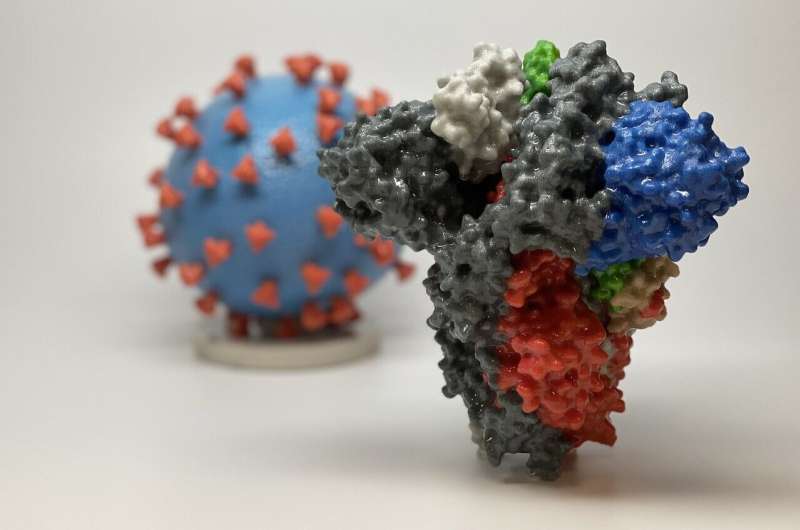Large, delayed outbreaks of endemic diseases possible following COVID-19 controls

Measures to reduce the spread of COVID-19 through non-pharmaceutical interventions (NPIs) such as mask wearing and social distancing are a key tool in combatting the impact of the ongoing coronavirus pandemic. These actions also have greatly reduced incidence of many other diseases, including influenza and respiratory syncytial virus (RSV).
Current reductions in these common respiratory infections, however, may merely postpone the incidence of future outbreaks, according to a study by Princeton University researchers published Nov. 9 in the Proceedings of the National Academy of Sciences.
"Declines in case numbers of several respiratory pathogens have been observed recently in many global locations," said first author Rachel Baker, an associate research scholar at the High Meadows Environmental Institute (HMEI) at Princeton University.
"While this reduction in cases could be interpreted as a positive side effect of COVID-19 prevention, the reality is much more complex," Baker said. "Our results suggest that susceptibility to these other diseases, such as RSV and flu, could increase while NPIs are in place, resulting in large outbreaks when they begin circulating again."
Baker and her co-authors found that NPIs could lead to a future uptick in RSV—an endemic viral infection in the United States and a leading cause of lower respiratory-tract infections in young infants—but that the same effect was not as pronounced for influenza.
"Although the detailed trajectory of both RSV and influenza in the coming years will be complex, there are clear and overarching trends that emerge when one focuses on some essential effects of NPIs and seasonality on disease dynamics," said co-author Gabriel Vecchi, Princeton professor of geosciences and the High Meadows Environmental Institute.
The researchers used an epidemiological model based on historic RSV data and observations of the recent decline in RSV cases to examine the possible impact of COVID-19 NPIs on future RSV outbreaks in the United States and Mexico.
They found that even relatively short periods of NPI measures could lead to large future RSV outbreaks. These outbreaks were often delayed following the end of the NPI period, with peak cases projected to occur in many locations in winter 2021-22. "It is very important to prepare for this possible future outbreak risk and to pay attention to the full gamut of infections impacted by COVID-19 NPIs," Baker said.
The authors also considered the implications of COVID-19 NPIs for seasonal influenza outbreaks and found results qualitatively similar to RSV. The dynamics of influenza are much harder to project due to viral evolution, however, which drives uncertainty over future circulating strains and the efficacy of available vaccines.
"For influenza, vaccines could make a big difference," Baker said. "In addition, the impact of NPIs on influenza evolution is unclear but potentially very important."
"The decrease in cases of influenza and RSV—as well as the possible future increase we project—is arguably the broadest global impact of NPIs across a variety of human diseases that we've seen," said co-author Bryan Grenfell, the Kathryn Briger and Sarah Fenton Professor of Ecology and Evolutionary Biology and Public Affairs, who is associated faculty in HMEI.
"NPIs could have unintended longer-term impacts on the dynamics of other diseases that are similar to the impact on susceptibility we projected for RSV," he said.
A similar effect of pandemic-related NPIs on other pathogens was observed following the 1918 influenza pandemic. Historic measles data from London show a shift from annual cycles to biennial outbreaks following a period of control measures implemented at that time.
Co-author C. Jessica Metcalf, associate professor of ecology and evolutionary biology and public affairs and an associated faculty member in HMEI, said that directly evaluating the associated risks of NPIs by developing and deploying tools such as serology that would better measure susceptibility is an important public health and policy direction. "The future repercussions of NPIs revealed by this paper hinge on how these measures change the landscape of immunity and susceptibility," Metcalf said.
The paper, "The impact of COVID-19 non-pharmaceutical interventions on the future dynamics of endemic infections" was published online Nov. 9 by the Proceedings of the National Academy of Sciences.
More information: Rachel E. Baker et al, The impact of COVID-19 nonpharmaceutical interventions on the future dynamics of endemic infections, Proceedings of the National Academy of Sciences (2020). DOI: 10.1073/pnas.2013182117




















